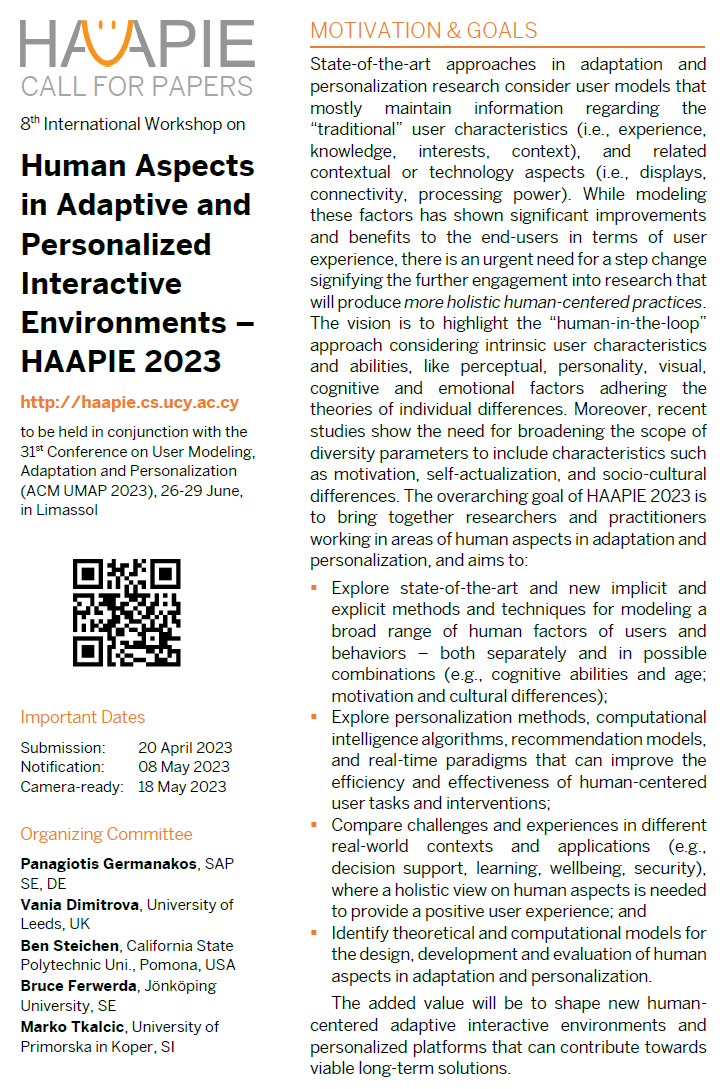Authors
Topics of Interest
Topics of interest include, but are not limited to:
- Human-centered Modeling, Adaptation Methods and Techniques
- Influence of Human Factors on Interactive Systems for Personalization
- Usage of Human Factors for Personalization
- Implicit and Explicit Detection of Human Factors for Personalization
- Human-centered Algorithms for Content Recommendation and Delivery
- Novel Human-centered Interaction Concepts and User Interfaces
- Individual Differences (Personality, Cognition, Gender, Age, etc.)
- Synergy of Affective and Human Cognitive Factors
- Modeling Groups and Communities of Diverse Users
- Evaluation of Human Aspects in Adaptation and Personalization
- Personalized Access to Services Content
- User Experience in Human-centered Systems
- Cultural and Language Diversity and Adaptation
- Age-specific Personalization and Adaptation
- Adaptation and Personalization for Users with Special Needs
- Personalization and Adaptation for Behavior Change
- User Context Awareness
- Human Aspects in Personalized Internet of Things Applications
- User-centric Cyber-Physical-Social Adaptive Systems
- Human Aspects in Social Adaptive Robots
- Adaptation and Personalization in Usable Privacy and Security
- Privacy and Ethical Aspects of Modeling Human Factors in Personalization Systems
Type of Papers
In HAAPIE 2023 we encourage original and relevant contributions focusing on experiences and lessons learned from real-life applications, current state-of-the-art methodologies, challenges tackled and solutions adopted, tools, algorithms, and services in the academic, public or private sector, studies, theories, techniques, and evaluation procedures that could support human-centered adaptation and personalization issues in various levels of interactive environments.
All workshop papers must contain original, previously unpublished, research work adhering the two publication types:
- Full research papers (10 pages, excluding references), proposing new approaches, innovative methods and research findings. They should make substantial theoretical and empirical contributions to the research field.
- Short research papers (7 pages, excluding references), presenting work in progress, lessons learnt, positions, emerging or future research issues and directions on human aspect challenges in the area.
Manuscripts should be formatted according to the new workflow for ACM publications. The templates and instructions are available here: https://www.acm.org/publications/taps/word-template-workflow. Authors should submit their papers as single-column. Please note that ACM changed its templates at the start of 2019, so please ensure that you use the new template and do not reuse an old template.
Submission and Publication
All papers will undergo a peer review process by at least two expert reviewers to ensure a high standard of quality. Referees will consider originality, significance, technical soundness, clarity of exposition, and relevance to the workshop’s topics.
Research papers should be submitted electronically as a single PDF file through the EasyChair submission system by selecting the track "Workshop-HAAPIE" (https://easychair.org/conferences/?conf=umap23).
All accepted papers will be published by ACM and will be available via the ACM Digital Library. At least one author of each accepted paper must register for the conference and present the paper in the workshop.




